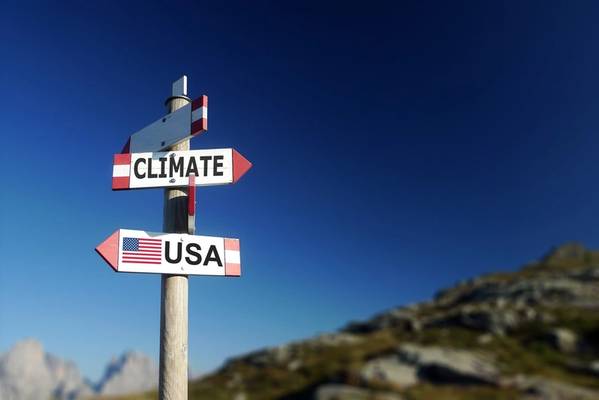
President Donald Trump once again withdrew the United States from the Paris climate deal on Monday, removing the world's biggest historic emitter from global efforts to fight climate change for the second time in a decade.
The move places the United States alongside Iran, Libya and Yemen as the only countries in the world outside the 2015 pact, in which governments agreed to limit global warming to 1.5 degrees Celsius (2.7 degrees Fahrenheit) above pre-industrial levels to avoid the worst impacts of climate change.
It reflects Trump's skepticism about global warming, which he has called a hoax, and fits in with his broader agenda to unfetter U.S. oil and gas drillers from regulation so they can maximize output.
Trump signed the executive order withdrawing from the pact in front of supporters gathered at the Capital One Arena in Washington.
"I'm immediately withdrawing from the unfair, one-sided Paris climate accord rip-off," he said before signing the order.
"The United States will not sabotage our own industries while China pollutes with impunity," Trump said.
China said it is concerned about the announcement, citing climate change as a common challenge faced by all humankind.
"No country can stand aloof from it, nor can any country do it alone," Chinese foreign ministry spokesperson Guo Jiakun said at a regular news briefing on Tuesday.
Guo said that China has been consistent in addressing climate change, and will actively respond to the challenges and jointly promote global green and low-carbon transformation.
Despite the withdrawal, United Nations Secretary-General Antonio Guterres is confident that U.S. cities, states and businesses "will continue to demonstrate vision and leadership by working for the low-carbon, resilient economic growth that will create quality jobs," said associate U.N. spokesperson Florencia Soto Nino, in a written statement.
"It is crucial that the United States remains a leader on environmental issues," she said. "The collective efforts under the Paris Agreement have made a difference but we need to go much further and faster together."
The United States has to formally notify U.N. Secretary General Antonio Guterres of its withdrawal, which - under the terms of the deal - will take effect one year later.
The United States is already the world’s top producer of oil and natural gas thanks to a years-long drilling boom in Texas, New Mexico and elsewhere, fueled by fracking technology and strong global prices since Russia’s invasion of Ukraine.
Second U.S. Withdrawal
Trump also withdrew the U.S. from the Paris deal during his first term in office, though the process took years and was immediately reversed by the Biden presidency in 2021. The withdrawal this time around is likely to take less time – as little as a year - because Trump will not be bound by the deal’s initial three-year commitment.
This time could also be more damaging to global climate efforts, said Paul Watkinson, a former climate negotiator and senior policy advisor for France.
The U.S. is currently the world's second-biggest greenhouse gas emitter behind China and its departure undermines global ambition to slash those emissions.
"It will be harder this time because we are in the thick of implementation, up against real choices," Watkinson said.
The world is now on pace for global warming of more than 3 C by the end of the century, according to a recent United Nations report, a level scientists warn would trigger cascading impacts such as sea level rise, heat waves, and devastating storms.
Nations have already been struggling to make steep cuts to emissions required to lower the projected temperature increase, as wars, political tensions and tight government budgets push climate change down the list of priorities.
Trump’s approach cuts a stark contrast to that of former President Joe Biden, who wanted the United States to lead global climate efforts and sought to encourage a transition away from oil and gas using subsidies and regulations.
Trump has said he intends to unwind those subsidies and regulations to shore up the nation’s budget and grow the economy, but has said he can do that while ensuring clean air and water in the United States.
Li Shuo, an expert in climate diplomacy at the Asia Society Policy Institute, said the U.S. withdrawal risks undermining the United States' ability to compete with China in clean energy markets such as solar power and electric vehicles.
"China stands to win, and the U.S. risks lagging further behind," he said.
(Reuters - Reporting by Valerie Volcovici, Jarrett Renshaw and Jasper Ward; Additional reporting by Eduardo Baptista and Lewis Jackson in Beijing; Additional writing by Liz Lee; Editing by Caitlin Webber, Nia Williams, Rod Nickel and Michael Perry)